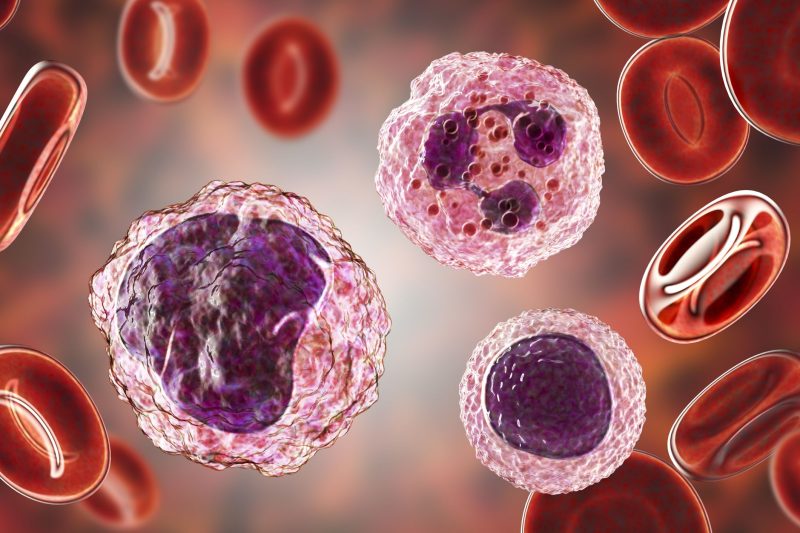
A low neutrophil count indicates the development of neutropenia, a form of leukopenia that reduces the body’s ability to fight bacterial and fungal infections. This implies that the inflammatory response against these antigens is ineffective, and serious complications can occur.
There are several reasons why there may be a low neutrophil count—these range from infections and drug reactions to vitamin deficiency and some diseases. Below we will tell you more about the causes and treatments.
Contents
What are neutrophils, and what is their importance?
In the body, white blood cells or leukocytes fight various infections, whether viruses, bacteria, fungi, or other organisms cause them.
Neutrophils are the most abundant type of white blood cell in the blood, corresponding to 70% of all leukocytes. Hence, maintaining a high count of them is essential since their quantitative changes cause some problems.
Its primary function is to help the immune system fight diseases of infectious origin, taking up the invading agent -particularly bacteria and fungi- and then directing and expelling it.
When the body is attacked, neutrophils are the first immune cells to detect the point of infection. Due to their gelatinous consistency, they easily penetrate the walls of blood vessels to migrate to affected tissues and destroy pathogens.
Values indicating low blood neutrophil count
Normal neutrophil levels in a healthy adult range from 2,000 to 7,500 per microliter of blood. The lower counts are classified according to their severity:
- Mild neutropenia: The absolute neutrophil count is 1,000 to 1,500/µL, and the risk of infectious disease is relatively low.
- Moderate: The neutrophil count is between 500 and 1,000/µL, and the risk of infection is mild.
- Severe neutropenia: meager neutrophil count, less than 500 µl; the risk of infection is high.

Why does a low neutrophil count occur?
As an article published by the Mayo Clinic puts it, various factors are associated with a low neutrophil count. In particular, two leading causes are considered:
- The decrease in the production of these leukocytes.
- Leukocytes are destroyed in a short time after being produced.
Both cases are related to some medical conditions and habits that affect immune health, such as the following:
- Viral, bacterial, or parasitic infections. For example, AIDS, tuberculosis, malaria, and Epstein-Barr virus (EBV).
- Drugs that affect the bone marrow and neutrophils. Those at most significant risk are dipyrone, ticlopidine, calcium desolate, and antithyroid drugs. To a lesser extent are antiepileptics, such as phenytoin or carbamazepine.
- Oncological treatments. Such as chemotherapy, radiation therapy, and certain drugs used to treat cancer. These, in general, damage the neutrophils during the process.
- Vitamin B12 or folate deficiency. It is related to megaloblastic anemia.
- Cancer or other diseases of the bone marrow. Like leukemias, myelodysplastic syndrome, aplastic anemia, and myelofibrosis.
- Congenital disorders of bone marrow function. For example, Kostmann syndrome.
- Autoimmune destruction of neutrophils (as a primary condition or related to Felty’s syndrome).
- Other autoimmune diseases: granulomatosis with polyangiitis (or Wegener’s granulomatosis) and lupus.
- Hypersplenism: premature destruction of blood cells by the spleen.
Other factors are related to a low white blood cell count, which can be closely linked to various diseases; In addition to those mentioned above, we have:
- Hepatitis A and B.
- hyperthyroidism
- Rheumatoid arthritis.
- Congenital diseases.
- Infiltrative processes of the bone marrow.
- Excessive consumption of alcoholic beverages.
- Prolonged use of some antibiotics and diuretics.
Low Neutrophil Symptoms
A low neutrophil count is usually diagnosed when severe infections or sepsis develop. Many mild cases go unnoticed because the symptoms are not entirely obvious.
The manifestations with which it presents can vary depending on the severity of the neutropenia and, likewise, the type of infection or underlying disease.
In other words, rather than signs of neutropenia, what is manifested are the symptoms of infections. In this sense, patients may experience the following:
- Sore throat.
- Frequent diarrhea.
- Moderate and high fever.
- Recurring headaches.
- Susceptibility to infections.
- Lesions or ulcers in the mouth and anal region.
- Swelling of the lymph nodes.
- Skin infections and wounds that take time to heal.
- Burning sensation when urinating and changes in urination.
Diagnosis and treatment
Neutropenia is diagnosed with a neutrophil count through a complete blood count. The doctor may suggest a complementary test such as a biopsy, if the results are uncertain.
The diagnosis is positive in adults when the absolute neutrophil count is less than 1500 per microliter of blood. The cell count to indicate neutropenia in children varies with age.
Treatment in case of a low neutrophil count is based on controlling the underlying cause and maintaining vigilance over the patient’s general health to prevent infections.
Of course, the treatment administration varies in each case, depending on the severity with which it is presented. The most common ones usually include the following:
- Granulocyte transfusions
- Antibiotic and antifungal medications in case of infections.
- Therapy with corticosteroids or intravenous immunoglobulins.
- Administration of white blood cell growth factors if neutropenia is very severe.
Possible complications
As mentioned, neutropenia is considered severe when the neutrophil count is below 500 per microliter of blood. When this happens, dangerous infections can compromise the patient’s health.
And they are not only caused by external microorganisms but even by bacteria that usually live in the body, both on the skin and on the mucous membranes of the mouth or intestine.
When to go to the doctor
When neutropenia has been diagnosed, one must be attentive to various signs. In this order of ideas, it is recommended to call the doctor if symptoms such as the following occur:
- Fever more significant than 38°C, with chills or cold sweat
- Difficulty breathing
- cough that comes on suddenly
- Sore throat or neck
- Difficulty urinating
- vomiting and diarrhea
- vaginal discharge
- Redness and swelling around wounds
Preventive measures to avoid infections
Those patients whose low neutrophil count is caused by an infection should also implement some preventive measures. For example, regular hand washing and wearing gloves and face masks can limit the risk of diseases.
In the same way, good hygiene habits must be followed when handling food to cook and consume it. In addition, it is recommended not to come into close contact with people who show symptoms of infection, as well as to avoid crowded places.